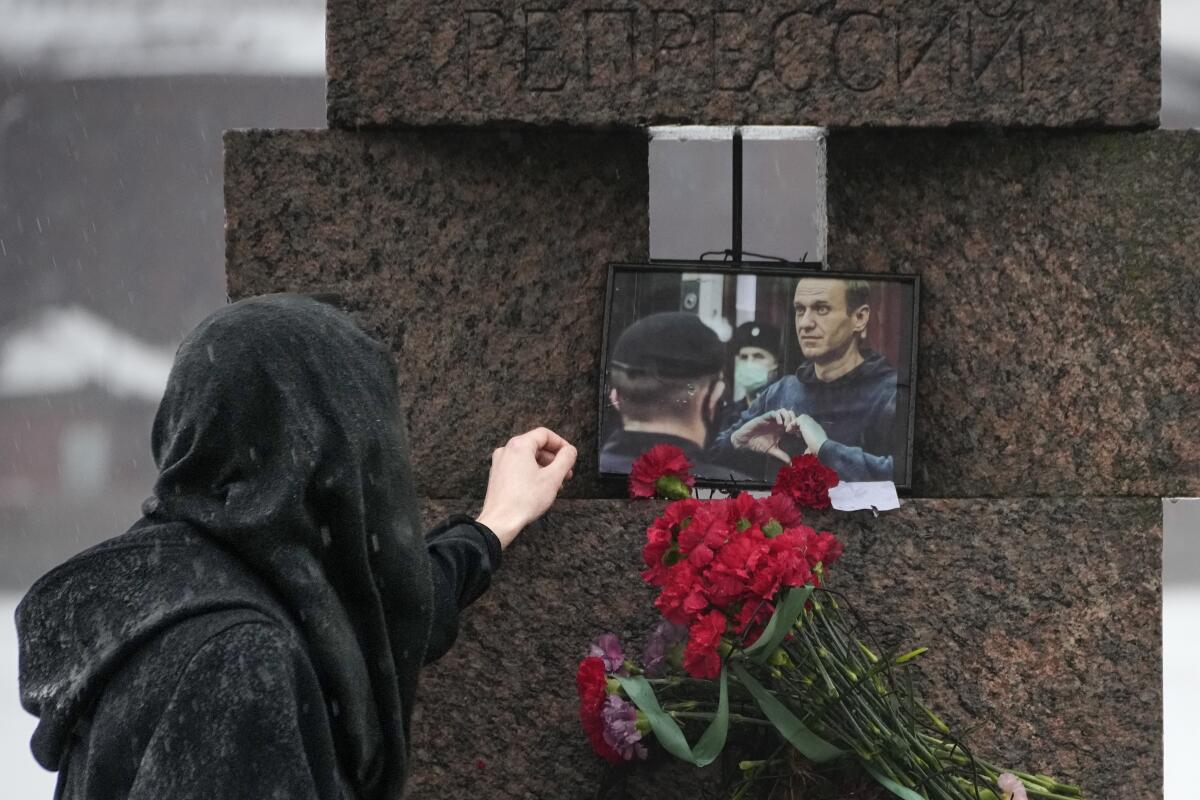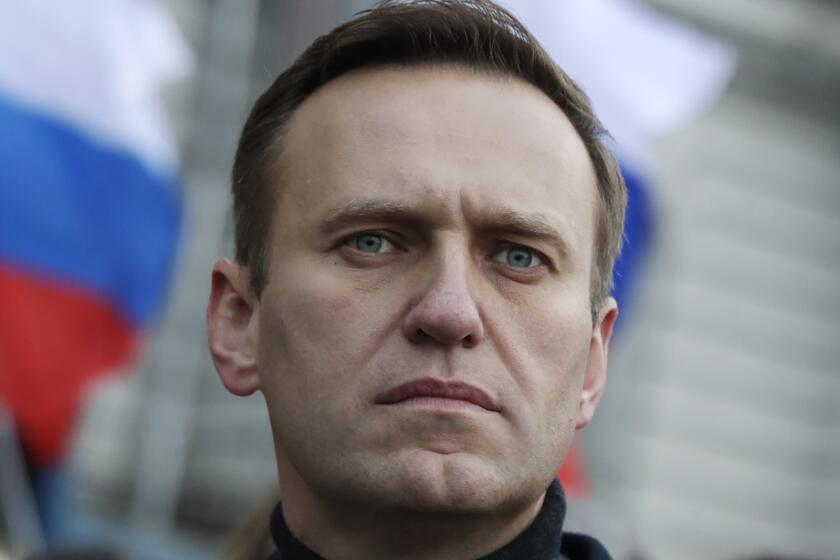In Russia’s Arctic area, Alexei Navalny’s mother searches for her son’s body

- Share via
For the mother of Alexei Navalny, the Russian opposition leader who died at age 47 in an Arctic penal colony, the journey to recover her son’s body Saturday was an odyssey with no clear destination.
In the end, she didn’t get what she came for.
Lyudmila Navalnaya, 69, received an official note Saturday stating that the politician had died in prison at 2:17 p.m. local time a day earlier, Kira Yarmysh, Navalny’s spokesperson said Saturday.
Together with members of Navalny’s legal team, Lyudmila traveled to the town of Kharp in the Yamalo-Nenets region, some 1,200 miles northeast of Moscow.
It was there that Russia’s Federal Penitentiary Service said Friday that Navalny felt unwell after a walk and fell unconscious. When Lyudmila arrived less than 24 hours later, officials said that her son had died from “sudden death syndrome,” said Ivan Zhdanov, the director of Navalny’s Anti-Corruption Foundation. He did not elaborate.
Navalny’s death removed the Russian opposition’s most well-known and inspiring politician less than a month before an election that will give President Vladimir Putin another six years in power.
Prison employees told Navalny’s mother Saturday that they did not have her son’s body. They said it had been taken to the nearby city of Salekhard, a little over an hour’s drive away, as part of a probe into his death.
When Lyudmila arrived in the town with one of Navalny’s lawyers, however, they found that the morgue was closed, Navalny’s team wrote on their Telegram channel. When the lawyer called the morgue, they were told that the politician’s body was not there either.
This time, Lyudmila headed directly to Salekhard’s Investigative Committee office. A small group of journalists watched as Lyudmila walked toward the office, dressed in a thick black coat as temperatures hovered close to minus 13 degrees Fahrenheit. Occasionally, she took the arm of one of those walking next to her as the group made their way along paths edged with thick piles of snow.
Here, she was told that the cause of her son’s death had, in fact, not yet been established, said Navalny’s spokesperson, Kira Yarmysh. Officials told Lyudmila that the politician’s relatives would not receive his body until they had completed additional examinations.
Initially, it seemed as if Lyudmila might head to another morgue. Instead, she returned to her hotel in the town of Labytnangi, another 30-minute drive. Navalny’s team, meanwhile, said they were still no closer to finding out where the politician’s body was being held.
“It’s obvious that they are lying and doing everything they can to avoid handing over the body,” Yarmysh wrote on X, formerly known as Twitter, after Lyudmila’s visit to the Investigative Committee office. The spokesperson also said that Navalny’s team demanded “that Alexei Navalny’s body be handed over to his family immediately.”
Alexei Navalny, Russia’s best-known opposition figure, has died in a prison colony, authorities say. Biden and other Western leaders blame Putin.
Meanwhile, arrests continued Saturday as Russians came to lay flowers in memory of Navalny at memorials to the victims of Soviet-era purges. OVD-Info, a group that monitors political repression in Russia, said Saturday that more than 273 people had been detained at memorial events since Navalny’s death.
Memorial items laid Friday were removed overnight, but people continued trickling in with flowers Saturday. In Moscow, a large group of people chanted, “shame,” as police dragged a screaming woman from the crowd, video shared on social media showed.
More than 10 people were detained at a memorial in St. Petersburg, including a priest who came to conduct a service for Navalny there.
In other cities across the country, police cordoned off some of the memorials and officers were taking pictures of those who came and writing down their personal data in a clear intimidation attempt.
“After the murder of Alexei Navalny, it’s absurd to perceive Putin as the supposedly legitimate head of the Russian state,” Ukrainian President Volodymyr Zelensky said at the Munich Security Conference in Germany on Saturday. “He is a thug who maintains power through corruption and violence.”
U.K. Foreign Secretary David Cameron said Saturday that Britain “will be taking action” against the Russians responsible for Navalny’s death.
Speaking to broadcasters in Munich, Cameron said, “there should be consequences” for “appalling human rights outrages like this.” He said Britain would “look at whether there are individual people that are responsible and whether there are individual measures and actions we can take.” Cameron did not say whether the response would consist of financial sanctions or other measures.
President Biden said on Friday that Washington doesn’t know exactly what happened, “but there is no doubt that the death of Navalny was a consequence of something Putin and his thugs did.”
The Kremlin bristled Friday at the outpouring of anger from world leaders, with Putin’s spokesman, Dmitry Peskov, calling the statements — issued before medics have released the cause of Navalny’s death — “unacceptable” and “outrageous.”
Navalny had been jailed since January 2021, when he returned to Moscow after recuperating in Germany from nerve agent poisoning he blamed on the Kremlin. He was later convicted three times, saying each case was politically motivated, and received a sentence of 19 years for extremism.
After the last verdict, Navalny said he understood he was “serving a life sentence, which is measured by the length of my life or the length of life of this regime.”
More to Read
Sign up for Essential California
The most important California stories and recommendations in your inbox every morning.
You may occasionally receive promotional content from the Los Angeles Times.














